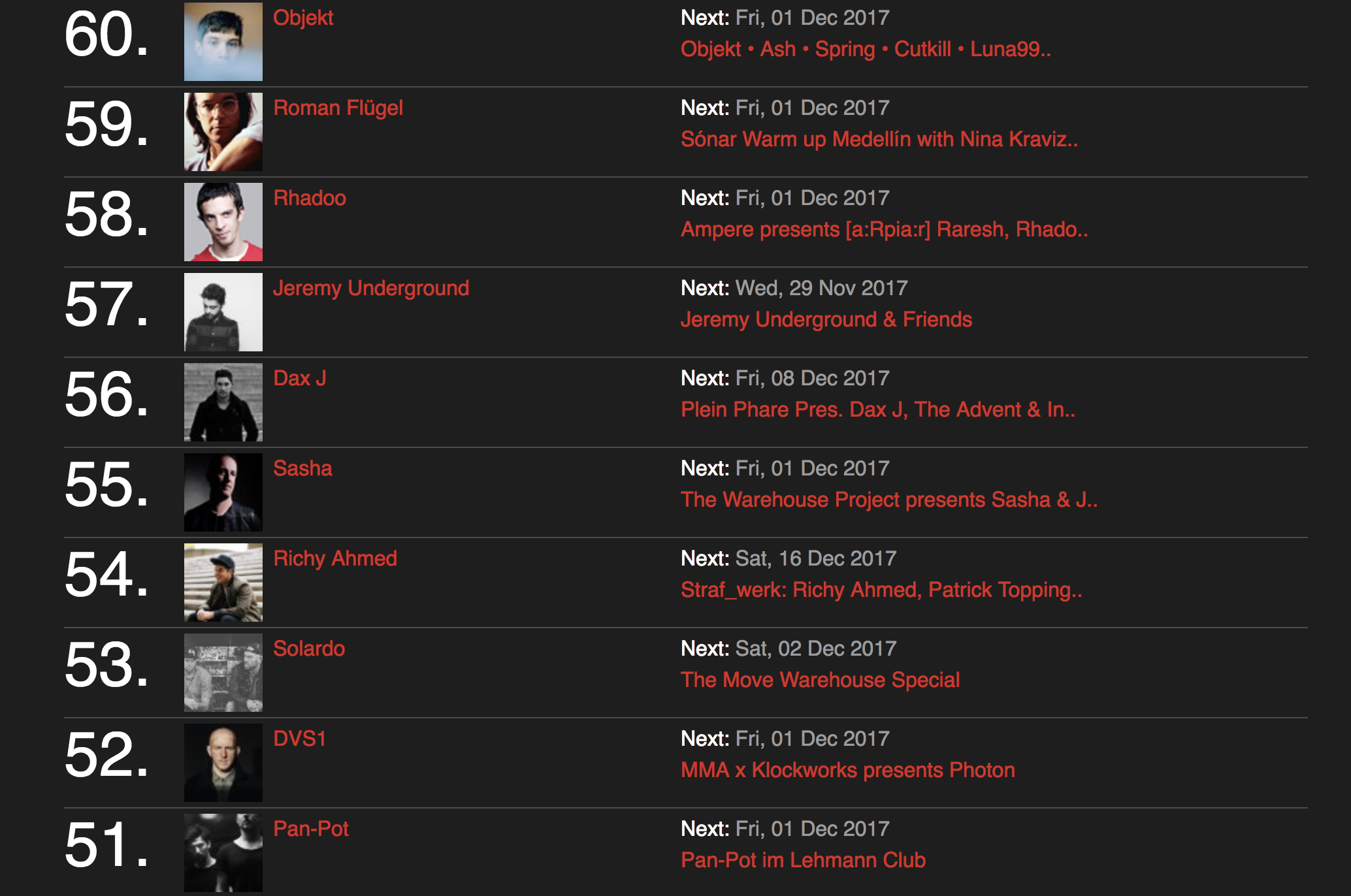After eleven years, tastemaking electronic music magazine Resident Advisor (RA) have decided to scrap their end-of-year polls, which rank (underground) artists (both DJs and live acts) based on the number of votes they receive from members of the general public. Originally starting in 2006, the first two editions of the polls were open only to RA contributors, before being expanded to allow anyone to vote in them. In a statement, the publication stated that they believe that recent end of year polls were not truly reflective of the diversity of the underground electronic music scene. It is difficult to argue against this; Innervisions label boss Dixon had been crowned number one DJ for the past four years, and whilst it is hard to deny his talent, you can’t help but feel that the polls had been reduced to little more than a popularity contest.
RA make the point that last year’s poll results lacked diversity, with the majority on the list being white male DJs from Europe and America. The results make for pretty grim readings. The Black Madonna, coming in at number ten, was the highest placed female and Nina Kraviz (22) was the only other female DJ in the top 30. Worse, after Helena Hauff (31), a female DJ doesn’t appear again until Lena Willikens at number seventy-six. So, according to the 2016 poll, only three of the world’s top seventy-five DJs are women. In the complete list of a hundred, just eight female DJs made the cut last year. Not a single woman of colour made it onto 2016’s list. On the live acts list, not a single women featured in the 2016 rankings.
This is problematic for several reasons. Firstly, it means that female DJs are not getting the recognition they deserve, especially in comparison with their male counterparts. Secondly, as admitted by RA, the rankings contribute to the reinforcement of harmful power dynamics, which favour (white) men above the rest. This fundamentally goes against everything underground dance music has stood for and represented over the past thirty years. The spirit of dance music, ever since its inception out of queer communities, is a togetherness that brings people from all races, genders and walks of life to enjoy themselves. It has always been about celebrating diversity, and especially allowing people from groups often marginalised in wider society to enjoy and express themselves freely, without fear of judgement or consequence. The recent polls were clearly not indicative of this, and thus were not representative of what the community is about.
This is v good pic.twitter.com/7iJ1FSLu2m
— DISCWOMAN (@DISCWOMANNYC) November 22, 2017
Another big problem with the polls, and rankings in general, is that is reduces art (in this instance music) to a meaningless competition. Dance music and DJing should not be about an end of year ranking about who’s the best, but about playing and enjoying music that you love. For the artists, their year should not be reduced to a number (if any) on a list. Music and DJing (and art in general) should not be about arbitrary comparisons, but about celebration and dancing. It might be true that a DJ could feel vindicated by a good end of year polling, but surely there are better ways of rewarding performance than by measuring who gets the most votes, as this often boils down to who has the loudest fans. Many artists have greeted the decision taken by RA with relief and delight, and who can blame them? It isn’t right for artists to be judged on such a fickle measurement, it’s unfair and almost ridiculous to have a list where artists are reduced to a ranking in a popularity contest. As artists, the DJs and live acts deserve far better than this.
Even if DJs ignore the polls, they have a wider effect on the industry, with reports of agents of some of the high performers using the rankings to demand bumper fees for the artists they represent. This affects promoters, as the more popular artists become more expensive, and thus may well become out of reach for new and upcoming nights. Some promoters (especially festivals) will use the rankings as a way of deciding who to book. As a result, many festival line-ups seem to be merely regurgitated and the scene becomes more saturated as fewer risks are taken. Put simply, ranking systems help to commodify dance music, reducing artists to merely products. Music is art, and art should never primarily be about commercial value and sales.
The decision by RA to stop the polls should be welcomed by everyone involved in the underground scene. They were unrepresentative of the electronic dance music scene, and insulting to the vast amount of hard work artists put into their work. Comparing your favourite selectors and performers is fine, but do it over a drink with friends and colleagues. There’s no need for a global chart, needlessly comparing artists and bringing unhealthy competition into a field which should really just be about a passion for music and dancing.
Lawrence Cwerner

